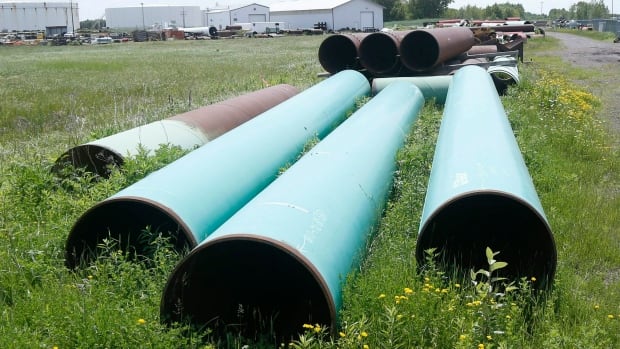
10 Apr Don’t shut Line 5: Biden administration issues long-awaited position on Canada-U.S. pipeline
The Biden administration has weighed in for the first time on a major cross-border legal dispute that could shut down portions of Enbridge’s Line 5 Canada-U.S. oil pipeline.
The opinion came in an amicus brief that, although nuanced, argued against shutting down the pipeline, partly in order to preserve diplomatic relations with Canada.
The more than 1,000-kilometre long Line 5 carries 540,000 barrels of oil and natural gas liquids daily across Wisconsin and Michigan to refineries in Sarnia, Ont.
The legal dispute in question is one to which the U.S. government is not actually a party. It involves Calgary-based Enbridge Inc. and the Wisconsin-based Bad River Band of Lake Superior Chippewa, through whose territory the pipeline runs.
In 2023, the U.S. District Court for the Western District of Wisconsin ruled in favour of the Bad River Band and ordered Enbridge to shut down parts of the pipeline within three years and pay the band $5.2 million for trespassing on its land after easement rights expired.
Both Enbridge and the band, which had wanted an immediate shutdown, appealed the ruling.
The Canadian government, in its own brief last fall, argued that a shutdown of the line would violate a 1977 Canada-U.S. pipeline agreement in which the countries agreed not to block the flow of each other’s hydrocarbons.
Wednesday’s submission from the U.S. Department of Justice cited Ottawa’s argument and urged the U.S. Court of Appeals for the 7th Circuit to send the ruling back to the lower court.
Government brief urges more compensation for band
On the one hand, Wednesday’s brief supported the financial penalty the lower court issued against Enbridge; in fact, it said the payment to the community should be increased.
On the other hand, it urged the appeals court to reverse the part of the ruling that would require a shutdown of several kilometres of the pipeline.
The reason? According to the U.S. Department of Justice, the lower court failed to take into account significant consequences, including the possibility of a costly dispute with Canada.
“The United States has a manifest interest in complying with its treaty obligations with all sovereigns,” said the 70-page amicus brief, publicly released Wednesday.
“The district court … did not consider what it had described as the ‘significant public policy implications’ that a shutdown order would have on the United States’s trade and diplomatic relationship with and treaty obligations to Canada.”
Another dispute ongoing in Michigan
Canada has for years pressed the Biden administration to weigh in on the pipeline dispute especially in light of the fact that it was that same administration that has already cancelled one Canada-U.S. pipeline project, Keystone XL, on its first day in office in 2021.
In its filing, the U.S. federal government cited Canada’s claim that a shutdown of the pipeline would have devastating economic consequences, particularly on parts of Central Canada.
It said that Canada has already invoked the 1977 Canada-U.S. treaty and said a shutdown could lead to a dispute process, arbitration and significant penalties if the U.S. were found to be violating its treaty obligations.

The appeal currently being considered is separate from another ongoing legal dispute between the state of Michigan and Enbridge over the same pipeline’s path through the Great Lakes.
The state points to a past spill as evidence of the environmental threat from Line 5 and has fought to block the aging pipeline from crossing the vital waterways.
The company, meanwhile, wants to build a new tunnel through the Straits of Mackinac, which link lakes Michigan and Huron.
Band River chairman ‘disappointed’
Reactions to the U.S. government filing in Wisconsin were, unsurprisingly, mixed.
A Canadian official briefed on the submission said the main assessment from government lawyers was that the submission is neutral to Canadian interests.
Indigenous and environmental groups reacted negatively.
Bad River Chairman Robert Blanchard said in a statement that the tribe was grateful the U.S. agrees Enbridge is operating on tribal land unlawfully but was “disappointed that the U.S. has not unequivocally called for an immediate end to Enbridge’s ongoing trespass.”
Whitney Gravelle, president of the Bay Mills Indian Community, another Chippewa Great Lakes community along the pipeline route, said in a statement that the filing left the community with “more questions than answers.”
“It also leaves Bad River, other Tribal Nations throughout the region, and the 40 million people that rely on the Great Lakes at risk of a catastrophic spill,” Gravelle said. “We fear it will take Line 5 failing again and the disaster of an oil spill for our position to be taken seriously.”
